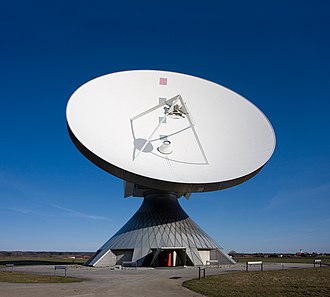Portal:Telecommunication
The Telecommunication Portal

Telecommunication, often used in its plural form or abbreviated as telecom, is the transmission of information with an immediacy comparable to face-to-face communication. As such, slow communications technologies like postal mail and pneumatic tubes are excluded from the definition. Many transmission media have been used for telecommunications throughout history, from smoke signals, beacons, semaphore telegraphs, signal flags, and optical heliographs to wires and empty space made to carry electromagnetic signals. These paths of transmission may be divided into communication channels for multiplexing, allowing for a single medium to transmit several concurrent communication sessions. Several methods of long-distance communication before the modern era used sounds like coded drumbeats, the blowing of horns, and whistles. Long-distance technologies invented during the 20th and 21st centuries generally use electric power, and include the telegraph, telephone, television, and radio.
Early telecommunication networks used metal wires as the medium for transmitting signals. These networks were used for telegraphy and telephony for many decades. In the first decade of the 20th century, a revolution in wireless communication began with breakthroughs including those made in radio communications by Guglielmo Marconi, who won the 1909 Nobel Prize in Physics. Other early pioneers in electrical and electronic telecommunications include co-inventors of the telegraph Charles Wheatstone and Samuel Morse, numerous inventors and developers of the telephone including Antonio Meucci, Philipp Reis, Elisha Gray and Alexander Graham Bell, inventors of radio Edwin Armstrong and Lee de Forest, as well as inventors of television like Vladimir K. Zworykin, John Logie Baird and Philo Farnsworth.
Since the 1960s, the proliferation of digital technologies has meant that voice communications have gradually been supplemented by data. The physical limitations of metallic media prompted the development of optical fibre. The Internet, a technology independent of any given medium, has provided global access to services for individual users and further reduced location and time limitations on communications. (Full article...)
Selected article -

A fiber-optic cable, also known as an optical-fiber cable, is an assembly similar to an electrical cable but containing one or more optical fibers that are used to carry light. The optical fiber elements are typically individually coated with plastic layers and contained in a protective tube suitable for the environment where the cable is used. Different types of cable are used for fiber-optic communication in different applications, for example long-distance telecommunication or providing a high-speed data connection between different parts of a building. (Full article...)
General images
Things to do
 |
Here are some tasks awaiting attention:
|
Selected biography -
John Logie Baird FRSE (/ˈloʊɡi bɛərd/; 13 August 1888 – 14 June 1946) was a Scottish inventor, electrical engineer, and innovator who demonstrated the world's first live working television system on 26 January 1926. He went on to invent the first publicly demonstrated colour television system and the first viable purely electronic colour television picture tube.
In 1928 the Baird Television Development Company achieved the first transatlantic television transmission. Baird's early technological successes and his role in the practical introduction of broadcast television for home entertainment have earned him a prominent place in television's history. (Full article...)
Did you know (auto-generated) -

- ... that professional golfer Cary Middlecoff co-owned Memphis, Tennessee, radio station WCBR in the mid-1950s?
- ... that an NFL scheduling decision forced ESPN to change the kickoff times and television networks of the 2022 Las Vegas Bowl and the 2022 New Mexico Bowl?
- ... that Ernst Jacobi, known for portraying Gauleiter Löbsack in Volker Schlöndorff's film The Tin Drum, played more than 200 roles as a television actor?
- ... that a scene from the television adaptation of the manga It's All About the Looks was filmed at the Tokyo Girls Collection fashion show?
- ... that the 1988 closure of WLEE, once one of the top radio stations in Richmond, Virginia, also took WBBL, a church station in existence for nearly 65 years, off the air for good?
- ... that Dave Frederick has been referred to as the "Sussex County humorist-teacher-writer-radio-host-philosopher dude"?
Related portals
Topics
Subcategories
Associated Wikimedia
The following Wikimedia Foundation sister projects provide more on this subject:
-
Commons
Free media repository -
Wikibooks
Free textbooks and manuals -
Wikidata
Free knowledge base -
Wikinews
Free-content news -
Wikiquote
Collection of quotations -
Wikisource
Free-content library -
Wikiversity
Free learning tools -
Wiktionary
Dictionary and thesaurus





























































































